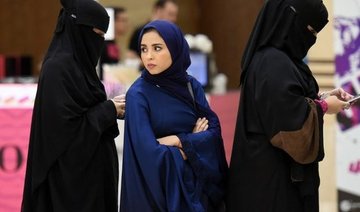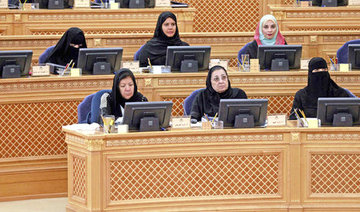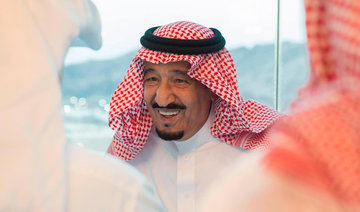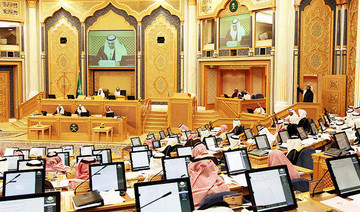DUBAI: Saudi women need not wear the abaya — the loose-fitting, full-length robes symbolic of religious faith — a senior member of the top Muslim clerical body said, another indication of the Kingdom’s efforts toward modernization.
On his radio show named Friday Studio aired on Neda Al-Islam radio station on Friday Feb. 9, Sheikh Abdullah Al-Mutlaq, a member of the Council of Senior Scholars, said Muslim women should dress modestly, but this did not necessitate wearing the abaya.
Friday Studio is a weekly Islamic show that discusses Islamic teachings, answers questions from the audience and issues fatwas by the show’s permanent guest Al-Mutlaq.
“More than 90 percent of pious Muslim women in the Muslim world do not wear abayas,” Sheikh Mutlaq said on Friday. “So we should not force people to wear abayas.”
While not necessarily signalling a change in the law, the statement is the first of its kind from a senior religious figure. It follows the recent pattern of freedoms the Kingdom has been witnessing with the ascent of young Crown Prince Mohammad bin Salman to power.
Only the government-appointed clerics associated with the Council of Senior Scholars are allowed to issue fatwas, or Islamic legal opinions. Their interpretations of Islamic law form the basis of Saudi Arabia’s legal system.
Saudi women have started wearing more colorful abayas in recent years, the light blues and pinks in stark contrast with the traditional black. Open abayas over long skirts or jeans are also becoming more common in some parts of the country.
The trend marks a major change in the last couple of years. In 2016, a Saudi woman was detained for removing her abaya on a main street in the capital of Riyadh. Local media reported that she was detained after a complaint was filed with the religious police.
The Kingdom has seen an expansion in women’s rights recently, such as the decision passed to allow women to attend mixed public sporting events and the announcement that Saudi Arabia would grant them the right to drive.
These are some of the many changes the country has undergone in recent months, hailed as proof of a new progressive trend in the deeply conservative Muslim Kingdom.
But despite these changes, the gender-segregated nation is criticized for its continued constraints on women. Activists have blasted the country’s guardianship system which requires a male family member to grant permission for a woman to study abroad, travel and other activities.
Long robes not necessary attire for Saudi women — senior cleric
Long robes not necessary attire for Saudi women — senior cleric
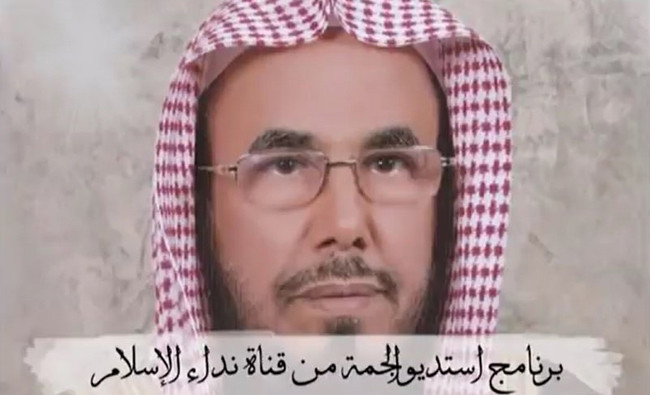
How green journalism in Saudi Arabia can grow stronger roots

- Experts call for closer media-academia bonds to boost impact of environmental journalism as Saudi Arabia ramps up sustainability efforts
- Reporters need more support, ranging from AI tools and training and expert access to explain complex climate and sustainability issues
RIYADH: Saudi Arabia’s accelerated sustainability drive under its Vision 2030 plan puts environmental journalism at a critical juncture. While coverage of science and environmental issues is expanding, experts say that oversimplification, lack of specialist training, and weak collaboration between journalists and scientists are holding back high-quality reporting.
Some Saudi media outlets are praised for scientific accuracy, but others often prioritize speed over substance, resulting in fragmented or sensationalized coverage. This inconsistency, experts say, limits public understanding of urgent environmental issues.
Academic and industry leaders in the Kingdom agree that tackling these shortcomings requires institutional investment, the establishment of specialized news units, and the adoption of advanced tools such as data analysis powered by artificial intelligence.
“One of the key challenges facing environmental journalists in Saudi Arabia is striking a precise balance between simplifying complex scientific information for a general audience and preserving its accuracy and scientific integrity,” said Talal Al-Shathry, an expert in environmental journalism.

He told Arab News that while some Saudi outlets have improved accuracy and objectivity through rigorous reporting, others continue to downplay or oversimplify key topics.
This trend, he added, often stems from a focus on speed and breaking news at the expense of deeper analysis.
To improve the quality and credibility of coverage, Al-Shathry emphasized the need for journalistic integrity. He said reporters must “avoid bias” by relying on credible, diverse sources, maintaining transparency throughout the reporting process, and disclosing potential conflicts of interest.
He also underscored the importance of specialized training in science and environmental journalism to help reporters handle the complexity of the topics. Without this training, he warned, journalists may unintentionally compromise the accuracy of the information they present.
Despite current challenges, Al-Shathry, an assistant professor at King Saud University’s Journalism and Mass Communication Department, noted recent improvements. “Saudi media has taken encouraging steps toward increasing its focus on environmental issues,” he said.
However, he urged greater emphasis on in-depth analysis, accurate scientific communication, and public engagement around sustainability. These efforts, he said, should be backed by more investment in training and resources.
To that end, Al-Shathry proposed several initiatives to strengthen ties between academia and the media, including workshops, joint conferences, and digital platforms that help journalists connect with environmental experts.
He also called for major media organizations to establish dedicated investigative teams focused on environmental issues. These units, he said, could deliver in-depth reporting, expose violations, and hold accountable those responsible for environmental harm.

Echoing these concerns, Mutlaq Al-Mutairi, supervisor of the Dr. Ibrahim Al-Muhanna chair for energy and specialized media, emphasized the role academic institutions must play in supporting this growing field.
According to him, university research chairs are designed to support specialized studies that align with national development goals, including environmental protection. “Environmental journalism is increasingly gaining prominence as a vital discipline, owing to its close connections with various sectors,” he told Arab News.
Still, Al-Mutairi acknowledged the gap between universities and the authorities meant to act on their findings. The issue, he said, is not a lack of research but a reluctance among institutions to engage in structured academic partnerships, with many opting to work with individual experts instead.
He cited several success stories that demonstrate the potential of stronger, institution-based collaboration and noted Saudi Arabia’s efforts to deepen international academic partnerships. But he cautioned that such collaborations must be effectively implemented to yield real-world benefits.
“Rather than allowing the media market to reshape academic training,” Al-Mutairi said, “educational institutions should shape the media landscape through their expertise and focus on specialization.”

Building on this theme, Sattam Fahad Al-Mojil, associate professor of environmental engineering at King Saud University, pointed to the way scientific content is often framed as a major obstacle.
He told Arab News that technical or globalized language too often fails to connect with people’s everyday concerns — such as health, clean water, or food security — reducing both awareness and engagement.
“Covering environmental issues isn’t easy — and for many journalists, it’s a constant uphill battle,” Al-Mojil said. “The complexity of scientific information makes it difficult to communicate without losing meaning, and most reporters receive little to no training in environmental journalism.”
“The lack of reliable sources and limited access to data or experts compounds the issue. Weak institutional interest in environmental topics means fewer resources and minimal editorial support,” he added.
Despite these barriers, Al-Mojil believes journalists can still make a meaningful impact. By taking a constructive tone and offering solutions alongside problems, reporting can help turn public anxiety into awareness — and, eventually, action.

He said that academics and experts are essential allies, helping to simplify complex concepts, interpret technical data and ensure accuracy. However, collaboration is limited due to institutional disconnects, different working styles and the pressures of the news cycle.
“Despite the importance of this collaboration, it remains limited due to weak institutional communication, differing approaches, and the time pressure journalists often face,” he said.
To bridge the gap, Al-Mojil proposed regular communication channels between media and academia. Joint initiatives — such as training sessions, workshops, and expert databases — could greatly improve the quality and impact of reporting.
DID YOU KNOW?
• Eco-journalism highlights climate change, conservation and sustainability to raise awareness and drive action.
• Environmental reporters face challenges in simplifying complex topics and engaging audiences.
• Eco-journalists use tools like interactive maps and multimedia to simplify complex issues and engage audiences.
Adding to the call for innovation, Farah Al-Gharib, founder and president of Precision & Choice Environmental Solutions, acknowledged recent progress but said current efforts remain inadequate in the face of climate change and other accelerating threats.
“Media coverage of environmental issues is often reactive rather than proactive,” she told Arab News. “This reality underscores the urgent need for greater investment in environmental journalism to keep pace with mounting challenges.”
Al-Gharib also highlighted the potential of technology to support sustainability. “Integrating smart systems is critical to advancing environmental sustainability,” she said. “By leveraging AI and modern technologies, we can classify facilities by environmental impact and use advanced data to support sustainable decision-making.”

Looking ahead, she said she expects environmental journalism in Saudi Arabia to become more specialized, data-driven and influential.
She described the field as a critical bridge between science and the public. “Its strength lies in transforming difficult concepts into clear, actionable information that empowers people to act,” Al-Gharib said.
Her company contributes to this mission by providing transparent data and maintaining open communication with journalists. “Effective communication between the media and the environmental sector is not a choice — it’s a necessity for building a greener tomorrow,” she said.

Thai festival brings eruption of color and music to Riyadh

- Event is a celebration of the strong and growing friendship between our countries and our people, says Thailand’s envoy
RIYADH: The Thai Festival in the Cultural Palace in Riyadh’s Diplomatic Quarter celebrates both Thailand’s rich culture and its blossoming friendship with Saudi Arabia.
Riyadh was chosen as one of six flagship cities around the world to hold the festival, alongside Washington DC, Beijing, New Delhi, Hanoi, and Paris.

At a press conference prior to the festival, which is open to the public May 2 and 3, Thailand’s Ambassador to Saudi Arabia Darm Boontham said: “This is a proud moment for us and a great opportunity to share the rich tradition and modern creativity of Thailand with our Saudi friends.”
The festival comes at a significant time, three years since the normalization of diplomatic relations between Thailand and Saudi Arabia.
HIGHLIGHTS
• This year’s theme is ‘The Pulse of Tradition, The Pulse of Tomorrow,’ reflecting Thailand’s pride in its culture and its commitment to innovation and creativity.
• The ministers of culture for Thailand and Saudi Arabia — Sudawan Wangsuphakijkosol and Prince Badr bin Abdullah Al-Saud — attended the event.
“This event is a celebration of the strong and growing friendship between our countries and our people,” Boontham continued.

This year’s theme is “The Pulse of Tradition, The Pulse of Tomorrow,” reflecting Thailand’s pride in its culture and its commitment to innovation and creativity.
The festival features several exhibitions of Thai products and services, including handicrafts from local communities in Thailand, live demonstrations, health and wellness products, eco-tourism, and Thai cuisine.

It also includes a live cooking show by a celebrity Thai chef, screenings of several beloved Thai movies followed by Q&A sessions, a musical and cultural performance, a Muay Thai boxing demonstration, a fashion show by Thai designers, and a Khon performance.
Khon, a traditional masked dramatic art that features music and dance as well as ritual, literary, and handicraft components, is included on UNESCO’s Intangible Cultural Heritage list, Boontham said.

“We invite everyone, Saudi nationals, residents and all friends of Thailand to join us for this unique celebration, to enjoy the science of sound and taste of Thailand and to continue building a warm and lasting friendship between our two great nations.”
The festival was organized by the Royal Thai Embassy in Saudi Arabia in partnership with Thailand’s private and public sectors, including Thai supply chain company SGC International’s Riyadh division, with the support of Saudi and Thai private companies.

The ministers of culture for Thailand and Saudi Arabia — Sudawan Wangsuphakijkosol and Prince Badr bin Abdullah Al-Saud — attended the event.
The objective of the festival goes beyond tourism, the ambassador said, it is intended to promote everything Thailand can offer in terms of creative economy, innovation, and how Thailand can tap into Saudi Vision 2030 and the Kingdom’s green initiative.

Boontham also confirmed plans to create Thai AirAsia X, a new low-cost airline from Thailand that should operate flights from Riyadh to Bangkok “very soon,” he said.
According to Boontham, the largest developing areas of cooperation between the two nations are economy, trade, and investment.

Over the last three years, the volume of trade has increased by an average of 25 percent and the ambassador is confident that “all the necessary mechanisms” are in place to support further growth.
In 2024, trade reached a value of $8.8 billion and the hope is that in two years that number will reach $10 billion, he added.

Boontham cited SGC International, a Thai company known for construction materials that is now expanding into petrochemicals, food, and food processing as a sign of promising investment in Saudi Arabia.
Technology sharing, in areas including green consumption technology, is “quite prevalent” and shows promise, he added.

Tourism is another large area of cooperation. Last year, around 230,000 Saudi tourists visited Thailand, and 13,000 Thai tourists visited Saudi Arabia; both numbers are expected to grow in coming years, the ambassador noted.
According to Boontham, “many Thai students” are coming to pursue their studies in Saudi as well, and Thailand is working hard to encourage more Saudis to study in Thailand.
In hospitality education, especially, “Thailand has a lot to offer Saudi students,” Boontham said. In 2024, 50 individuals from Saudi Arabia went to train in Thai hotels and institutions.
Arab Inter-Parliamentary Union to discuss peace, security

- Speaker of Saudi Shoura Council will head the Kingdom’s delegation in Algeria
RIYADH: Dr. Abdullah bin Mohammed bin Ibrahim Al Al-Sheikh, speaker of the Saudi Shoura Council, will head the Kingdom’s delegation taking part in the meetings of the 38th Congress of the Arab Inter-Parliamentary Union on May 3-4.
The conference will take place in Algeria, with the presence and participation of heads of councils and parliaments from Arab countries.
In a press statement, Al-Sheikh affirmed that the Kingdom, with the leadership of King Salman and Crown Prince Mohammed bin Salman, is keen on supporting joint Arab action, and unifying visions and positions in a way that consolidates security, stability and peace in the region and the world.
HIGHLIGHT
Al-Sheikh affirmed that the Kingdom, with the leadership of King Salman and Crown Prince Mohammed bin Salman, is keen on supporting joint Arab action, and unifying visions and positions in a way that consolidates security, stability and peace in the region and the world.
He pointed out the importance of parliamentary work, noting that it is a fundamental basis in strengthening Arab cooperation and unifying joint efforts.
He added that it is an effective platform that brings the brotherly countries’ points of view closer together, and harmonizes policies to promote sustainable development and advance the aspirations of people for a more secure future.
On the sidelines of the conference, heads of parliaments will hold a consultative meeting to discuss the conference’s subjects.
Meanwhile, the three permanent committees — the Palestine Committee; the Social Affairs, Women, Children, and Youth Committee; and the Political Affairs and Parliamentary Relations Committee — will hold their regular meetings.
The Executive Committee of the Arab Inter-Parliamentary Union is holding the 38th session, alongside the 46th meeting of the Association of Secretaries General of Arab Parliaments.
The Shoura Council delegation participating in the conference includes Secretary-General of the Shoura Council Mohammed bin Dakheel Al-Mutairi, member of the council and the union’s executive committee Dr. Abdulaziz bin Ibrahim Al-Muhanna, council members Abdullah bin Fahd Al-Husein and Khalid bin Mohammed Abu Malha, and several other council officials.
Najran’s Al-Tharwa Mountain reveals stories of early Islamic art

- Rocks preserve rare Islamic inscriptions
RIYADH: Hidden in the creek of Al-Tharwa Mountain, south of King Fahd Park in the Najran region, lies a living archive that tells the story of early Islamic art.
The mountain’s rocky features abound with prominent archaeological evidence of Islamic calligraphy in its earliest stages.
The rocks preserve rare Islamic inscriptions that serve as a historic record reflecting the ancient past and the richness of the Islamic civilization.
These inscriptions represent the precision and beauty of early Islamic art and calligraphy, revealing a significant transitional phase in the history of Arabic art and scripts.
This transforms Al-Tharwa Mountain into an open-air museum which narrates chapters from the beginnings of Islamic civilization.
Dr. Salem bin Ahmad bin Tairan, professor of Semitic languages, ancient writings, and archaeology at King Saud University, said: “Islamic inscriptions are an important and fundamental source for studying Islamic history and civilization.
“Najran abounds with a large number of such inscriptions dating back to the early Islamic period.
“Through the archaeological survey of inscriptions and ancient writings in the region, more than 200 Kufic Islamic inscriptions have been identified and documented across several sites, most notably Al-Tharwa Mountain in Saqam, south of Wadi Najran, where 33 Islamic inscriptions were found, 26 of which belong to members of a single family.”
Although these inscriptions are undated, the style of the script and the names of the individuals mentioned indicate that they date back to the second and third centuries AH.
Most of these inscriptions contain religious phrases and prayers, expressing belief in death, trust in God, monotheism, and blessings upon the Prophet, along with the signatures of their authors.
Abdullah Al-Suqour, a member of the Najran Tourist Club and a certified tour guide, explained that Al-Tharwa Mountain is considered an important archaeological and tourism landmark because of the historic evidence it contains, confirming the significance of early Islamic inscriptions which are distinguished by their beauty, organization, and precise linguistic structures.
He noted that among these inscriptions are some written by women, who engraved their names on the mountain’s rocks in commemorative and religious phrases — a sign of a civilized period in which education spread to all segments of society.
Al-Suqour added that Al-Tharwa Mountain is a prominent cultural destination which holds a rich cultural heritage of early Islamic inscriptions.
These archaeological treasures adorn the mountain, standing as some of the rarest evidence of the early development of engraving and Islamic calligraphy in the southern Arabian Peninsula.
Saudi Embassy hosts seminar in France

- President of the French Agency for AlUla Development Jean-Yves Le Drian praised the strong friendship and strategic alliance between Saudi Arabia and France and their steady development
RIYADH: The Saudi Embassy in France, in partnership with the Francophone Business Forum, hosted a seminar on Saudi Vision 2030, showcasing its achievements and partnerships.
The event coincided with the release of the ninth annual Saudi Vision 2030 report and drew ambassadors, French officials, media representatives, business leaders and consultants, the SPA reported on Friday.
Saudi Ambassador to France and the Principality of Monaco Fahd bin Mayouf Al-Ruwaili began the seminar with a welcoming speech, followed by an overview of the ninth annual Saudi Vision 2030 report.
He emphasized the report’s updated information, key achievements and the strong performance of its indicators.
These indicators have surpassed most targets in national programs and strategies — notably in human resource development, women’s empowerment, infrastructure development, technology localization, sustainable development and environmental protection.
He also spoke about Saudi-French cooperation and partnership under Saudi Vision 2030 and their joint efforts to enhance regional and international security and stability.
President of Francophone Business Forum Steve Gentili delivered a speech on the growing partnerships in business, technology and the financial sector, as well as mutual investments and the attractive business environment in Saudi Arabia.
President of the French Agency for AlUla Development Jean-Yves Le Drian praised the strong friendship and strategic alliance between Saudi Arabia and France and their steady development.
He provided an overview of the AlUla Development Project, a major initiative under Saudi Vision 2030, and discussed its success across all stages.


